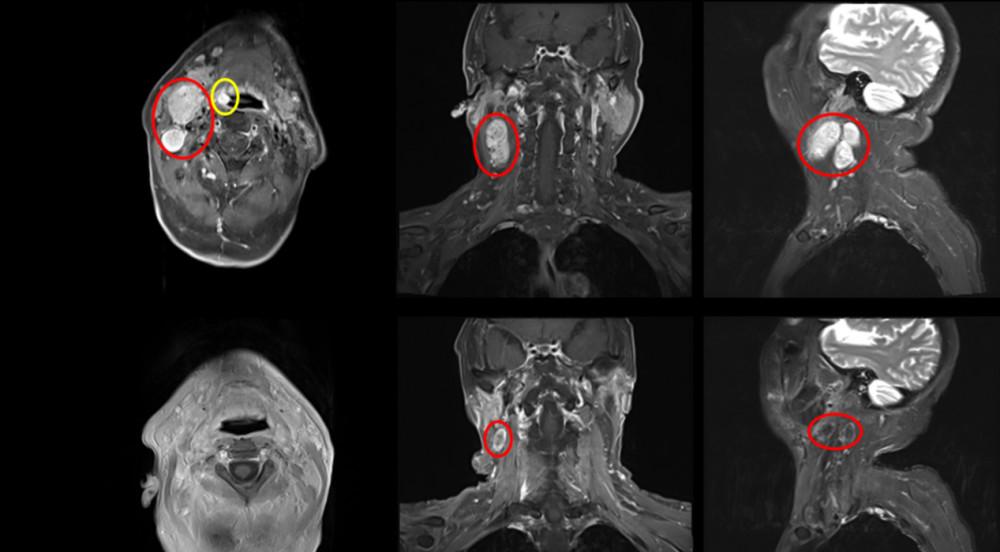67-year-old Uncle Zhang (patient) some time ago always felt that there was a small lump in the neck, at first it was not painful or itchy, and did not attract attention, and then found that the lump was slowly growing, which panicked, to the hospital puncture examination, it was squamous cell carcinoma.
Subsequently, Uncle Zhang went to the Department of Oncology and Internal Medicine of Yongchuan Hospital affiliated to the Heavy Medical Center for further diagnosis and treatment. After the doctor arranged for admission, the examination found that the right tonsillar I degree enlargement was found, and the new organism was seen in the lower pole, and the right side of the neck was piled with multiple rigid masses, up to about 5×4×3 cm. Head and neck MRI suggests malignancy of the right wall of the oropharynx and multiple lymph node metastases on the right side of the neck.
Uncle Zhang underwent a neobiopsy of the right tonsils under local anesthesia, and the pathological examination was invasive squamous cell carcinoma. For this condition, there are usually two regimens: surgery or radical chemoradiation. However, the patient's neck mass is large, and the boundary with the large blood vessels is not clear, it is difficult to completely remove the operation, and it may also damage the large blood vessels and cause heavy bleeding, and if the way of radiotherapy and chemotherapy is taken, it can better protect the function of the organs. After weighing the comparisons, Uncle Zhang and his family decided to choose radical chemoradiotherapy.

▲Before and after radiotherapy
At the same time, under the use of precise intensity-modulated radiotherapy, Uncle Zhang gave a total of 33 radiotherapy sessions, supplemented by weekly chemotherapy of nidaplatin. Side effects were mild during chemoradiotherapy, and a review of MRI after treatment suggested that the tonsillar tumor had disappeared and the lymph nodes in the right neck were reduced by 83%.
It is understood that radiation therapy (referred to as radiotherapy) has a history of more than 120 years, the last 20 years, with the increasing refinement of medical technology, radiotherapy has developed from the conventional "artillery era" to the "precision guidance" era, from the past "kill 1000 self-inflicted 800", stepped into the three-dimensional precision radiotherapy era, to achieve a precise attack on tumor cells.
▲Treatment site
Radiation therapy, like surgery and chemotherapy, is one of the three major means of malignancy treatment. At present, 55% of malignant tumors can heal themselves, of which surgery, radiotherapy and chemotherapy contribute 27%, 22% and 6% respectively. Radiotherapy refers to the use of radiation to kill tumor cells, the dose of radiation is concentrated into the tumor, killing tumor cells at the same time, to maximize the protection of adjacent normal tissues and organs.
It, like surgery, is a local treatment method, known as the "invisible scalpel", its biggest advantage is non-invasive, no blood, no scars, like the elderly patients who refuse surgery, because of internal diseases can not be operated on, surgery will lead to organ function damage of tumor patients, radiotherapy can replace surgical treatment.
Radiation therapy can also be used as an adjunct to certain tumor surgeries, such as: glioblastoma, breast cancer, lung cancer, rectal cancer, soft tissue sarcoma, etc. Radiation therapy has a good effect on tumor emergencies (superior vena cava syndrome, pain in bone metastases, hemoptysis of lung cancer, brain metastases, esophageal obstruction, prevention of paraplegia due to vertebral metastases, etc.). It can also be used for the treatment of certain benign diseases or low-grade malignancies, such as scarring, bone giant cell tumor, invasive fibromatosis, etc.
Department Introduction》》
The Department of Oncology of Yongchuan Hospital affiliated to Chongqing Medical University was established in the 1980s and is the first unit in Yuxi to carry out precision radiotherapy and chemotherapy for oncology. With the strong support of hospital leaders and the leadership of director Li Ming and director Zeng Li, the discipline has developed by leaps and bounds, and the most advanced three-dimensional conformal radiotherapy technology, intensity-modulated radiotherapy technology and real-time verification technology have been skillfully carried out, making the radiotherapy positioning more accurate, the treatment more refined, and the side reactions smaller. It can treat malignant tumors in various parts of the body, including: head and neck tumors, lung cancer, esophageal cancer, breast cancer, cervical cancer, prostate cancer, seminocytoma, malignant lymphoma, colorectal cancer, etc. (Textu/Guo Linling)